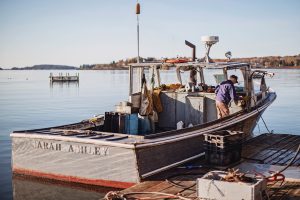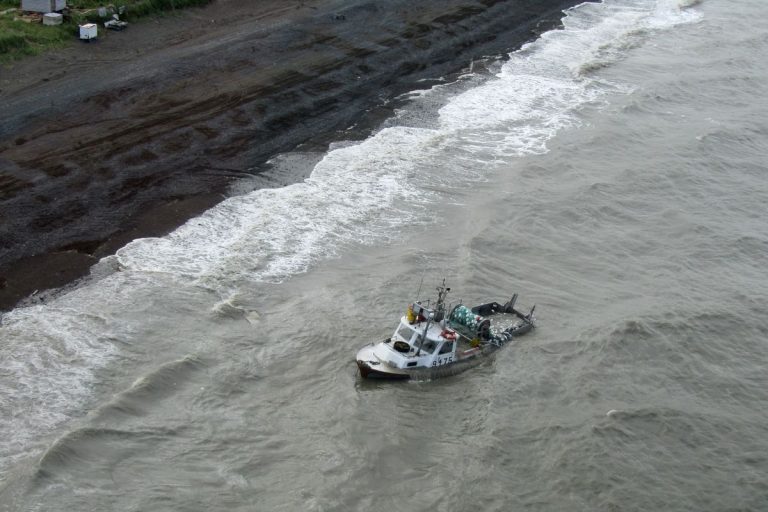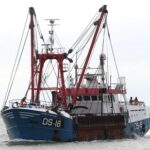Tag Archives: Center for Biological Diversity

Lawsuit Challenges Trump Administration’s Failure to Protect Pacific Humpback Whales Threatened by Fishing Gear, Ship Strikes, Oil Spills
The Center for Biological Diversity, Turtle Island Restoration Network and Wishtoyo Foundation today sued the Trump administration for failing to protect humpback whale habitat in the Pacific Ocean, where the animals face threats from fisheries, ship strikes and oil spills. Today’s lawsuit, filed in federal district court in San Francisco, aims to force the National Marine Fisheries Service to follow the Endangered Species Act’s requirement to designate critical habitat within one year of listing a species as threatened or endangered and not authorize actions that,,, >click to read< 16:12
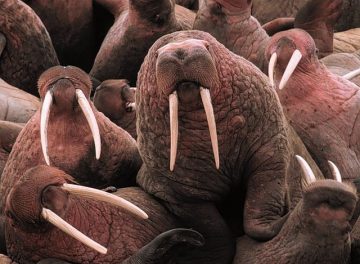
Feds Sued to Force Protection of Alaska’s Pacific Walrus
The Center for Biological Diversity sued the Trump administration Thursday over its denial of Endangered Species Act protection to the Pacific walrus. The lawsuit, filed in Anchorage federal court, challenges the October 2017 decision by the U.S. Fish and Wildlife Service finding the Pacific walrus does not warrant listing as a threatened or endangered under the Endangered Species Act. “The service’s listing decision deprives the walrus of the ESA protections which it is both entitled to and desperately needs,” the complaint states. >click to read<15:30

Suit by animal protection groups follows deaths of 17 right whales in Canadian and U.S. waters last year
Conservation and animal-protection groups have sued the National Marine Fisheries Service in the United States, alleging it failed to protect right whales from entanglement in commercial fishing gear. The lawsuit, which was filed in federal court in Washington, D.C., late last week, alleges the federal management of the U.S. lobster fishery violates the Endangered Species Act and the Marine Mammal Protection Act. The lawsuit seeks to force the National Marine Fisheries Service to do a sufficient examination of the fishery’s impact on North Atlantic right whales and adopt additional measures to prevent entanglements. >click here to read< 18:55

Lawsuit filed to save North Atlantic Right Whales from death in fishing gear
Today’s lawsuit against the National Marine Fisheries Service, filed in federal court in Washington, D.C., alleges that federal management of the American lobster fishery violates the Endangered Species Act and the Marine Mammal Protection Act. The lawsuit seeks to force the agency to sufficiently examine the fishery’s impacts on North Atlantic right whales and adopt additional measures to prevent more entanglements in the future. The lobster fishery is the most active fixed-gear fishery in the northeastern United States. >click here to read< 12:08 
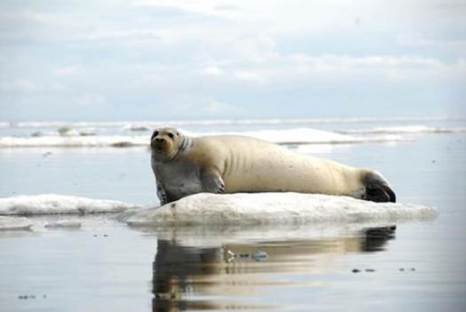
Listing the Bearded Seal as Threatened: A Disturbing Victory for Untestable Hypotheses and Flawed Models.
The Center for Biological Diversity also petitioned to list thriving populations of Bearded Seals as threatened or endangered by melting sea ice. In response to their petition, the National Marine Fisheries Service (NMFS) assembled a Bearded Seal Biological Review Team (BRT). The BRT’s report can be read here. Oddly, despite promoting a threatened designation, the BRT reports Bearded Seals have existed for over 1-2 million years, surviving far greater bouts of climate change as the earth bounced between several ice ages and warmer interglacials. An interesting (click here) read by Jim Steele 18:25:37
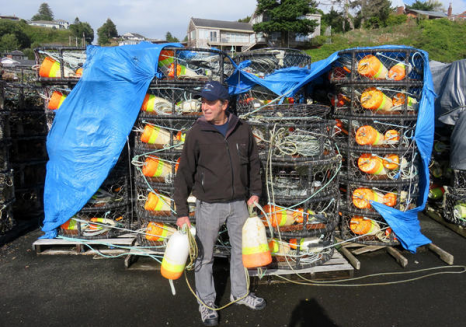
Fishermen: ‘We want to be proactive’ – Making The Sea Safer For Whales
More than 30 times this year, the federal government has received reports of whales tangled in fishing gear along the West Coast. Sometimes the whales manage to wriggle free. Other times you see heart-rending pictures on the news or a rescue mission. The culprit often involves Dungeness crab pot lines. Now Oregon crabbers are working with marine scientists to make the seas safer for whales and to avoid a black mark on their brand. Bob Eder has fished commercially out of Newport, Oregon for decades. “Over 45 years of pulling crab pots—I think I’ve probably hauled in close to a million—I’ve never encountered an entangled whale,” he said. ‘We want to be proactive’ click here to read the story 09:03
Enviro groups threaten Canadian snow crab imports over whale deaths
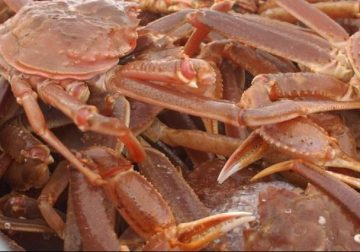 An alliance of U.S. environmental groups is preparing to ask Washington to ban imports of Canadian snow crab unless Ottawa steps up its efforts to save the endangered Atlantic right whales. Kristen Monsell, a senior attorney at the Center for Biological Diversity, said a provision of the United States Fishermen’s Protection Act allows the White House to ban imports of fish or seafood from a country if that catch is affecting conservation efforts of an endangered species. Monsell said snow crab is the target, because Canada has no mandatory regulations in place for snow grab gear or lines that could help keep whales from getting caught in them and Canada itself. click here to read the story 07:47
An alliance of U.S. environmental groups is preparing to ask Washington to ban imports of Canadian snow crab unless Ottawa steps up its efforts to save the endangered Atlantic right whales. Kristen Monsell, a senior attorney at the Center for Biological Diversity, said a provision of the United States Fishermen’s Protection Act allows the White House to ban imports of fish or seafood from a country if that catch is affecting conservation efforts of an endangered species. Monsell said snow crab is the target, because Canada has no mandatory regulations in place for snow grab gear or lines that could help keep whales from getting caught in them and Canada itself. click here to read the story 07:47
Conservationists plan to sue over right whale deaths
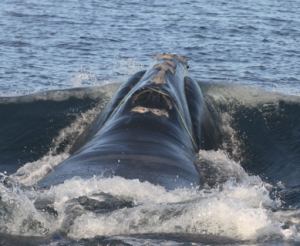 Animal conservation groups say they intend to sue the U.S. government unless North Atlantic right whales are better protected, following the deaths of 15 along U.S. and Canadian coasts. “We are literally facing the extinction of right whales due to human causes,” said Regina Asmutis-Silvia of Whale and Dolphin Conservation North America. In August, the National Oceanic and Atmospheric Administration, along with Fisheries and Oceans Canada, declared the deaths of North Atlantic right whales since June 7 an “unusual mortality event,” which triggered a focused and expert investigation into the causes. But the conservation groups want more. click here to read the story 10:01
Animal conservation groups say they intend to sue the U.S. government unless North Atlantic right whales are better protected, following the deaths of 15 along U.S. and Canadian coasts. “We are literally facing the extinction of right whales due to human causes,” said Regina Asmutis-Silvia of Whale and Dolphin Conservation North America. In August, the National Oceanic and Atmospheric Administration, along with Fisheries and Oceans Canada, declared the deaths of North Atlantic right whales since June 7 an “unusual mortality event,” which triggered a focused and expert investigation into the causes. But the conservation groups want more. click here to read the story 10:01
Walruses adapt to loss of sea ice and are not endangered, feds say
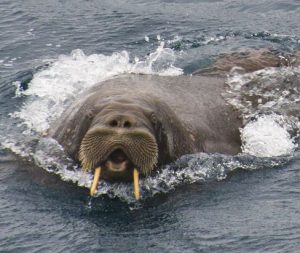 Blubbery, clam-loving Pacific walruses are surprisingly resilient to the dramatic loss of polar sea ice as the planet warms and won’t be listed as an endangered species, the federal government announced early Wednesday. The decision is controversial. A scientist for a group that works to protect endangered animals called it a Trump administration “death sentence for the walrus.” But Alaska Gov. Bill Walker, the state’s all-Republican congressional delegation, Native hunters, Arctic Slope Regional Corp. and the state Department of Fish and Game all said it was the right call. “This decision will allow for the continued responsible harvest of Pacific walrus for subsistence and traditional uses by Alaska Natives,” Sen. Lisa Murkowski said in a written statement. click here to read the story 21:11
Blubbery, clam-loving Pacific walruses are surprisingly resilient to the dramatic loss of polar sea ice as the planet warms and won’t be listed as an endangered species, the federal government announced early Wednesday. The decision is controversial. A scientist for a group that works to protect endangered animals called it a Trump administration “death sentence for the walrus.” But Alaska Gov. Bill Walker, the state’s all-Republican congressional delegation, Native hunters, Arctic Slope Regional Corp. and the state Department of Fish and Game all said it was the right call. “This decision will allow for the continued responsible harvest of Pacific walrus for subsistence and traditional uses by Alaska Natives,” Sen. Lisa Murkowski said in a written statement. click here to read the story 21:11
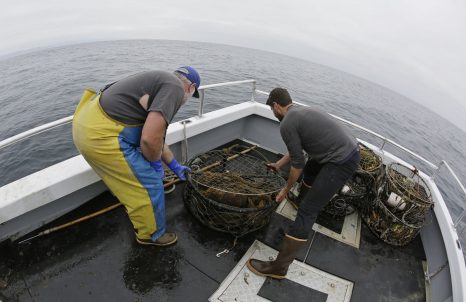
Environmental group sues California over whale-killing gear
An environmental group sued the state of California on Tuesday for allegedly not doing enough to keep Dungeness crab fishery gear from killing protected whales. The Center for Biological Diversity filed its lawsuit in federal court in San Francisco, saying the California Department of Fish and Wildlife is liable for a surge in entanglements of endangered whales and sea turtles because it authorizes and manages operation of the fishery. click here to read the story 15:18
Enviro Groups Demand U.S., Canada Act to Save North Atlantic Right Whales
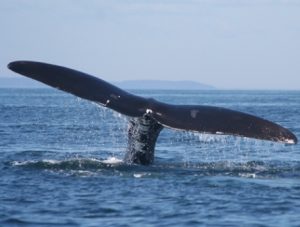 Conservation and animal-protection groups today sought action by the United States and Canada to prevent painful, deadly entanglements in fishing gear that threaten the critically endangered North Atlantic right whale. In letters to Canadian officials and the U.S. National Marine Fisheries Service, the groups demanded action to reduce risks to these imperiled whales. North Atlantic right whales, one of the world’s most endangered mammals with fewer than 500 individual animals remaining on Earth, lost nearly 3 percent of their population this year. click here to read the story 14:00
Conservation and animal-protection groups today sought action by the United States and Canada to prevent painful, deadly entanglements in fishing gear that threaten the critically endangered North Atlantic right whale. In letters to Canadian officials and the U.S. National Marine Fisheries Service, the groups demanded action to reduce risks to these imperiled whales. North Atlantic right whales, one of the world’s most endangered mammals with fewer than 500 individual animals remaining on Earth, lost nearly 3 percent of their population this year. click here to read the story 14:00
Lawsuit Launched to End Whale, Sea Turtle Entanglements in California Dungeness Crab Gear
 The Center for Biological Diversity today filed a formal notice of intent to sue California’s state wildlife agency for failing to prevent commercial Dungeness crab gear from entangling, injuring and killing threatened and endangered humpback whales, blue whales and sea turtles. California’s Department of Fish and Wildlife authorizes and manages operation of the fishery, which last year entangled at least 21 endangered or threatened whales, contributing to a third straight record-breaking year for entanglements along the U.S. West Coast. An endangered leatherback sea turtle was also caught in commercial Dungeness crab gear in 2016. Today’s notice letter notes that the Department’s failure to protect imperiled whales and sea turtles from entanglements in crab gear violates the federal Endangered Species Act. click here to read press release 20:47
The Center for Biological Diversity today filed a formal notice of intent to sue California’s state wildlife agency for failing to prevent commercial Dungeness crab gear from entangling, injuring and killing threatened and endangered humpback whales, blue whales and sea turtles. California’s Department of Fish and Wildlife authorizes and manages operation of the fishery, which last year entangled at least 21 endangered or threatened whales, contributing to a third straight record-breaking year for entanglements along the U.S. West Coast. An endangered leatherback sea turtle was also caught in commercial Dungeness crab gear in 2016. Today’s notice letter notes that the Department’s failure to protect imperiled whales and sea turtles from entanglements in crab gear violates the federal Endangered Species Act. click here to read press release 20:47
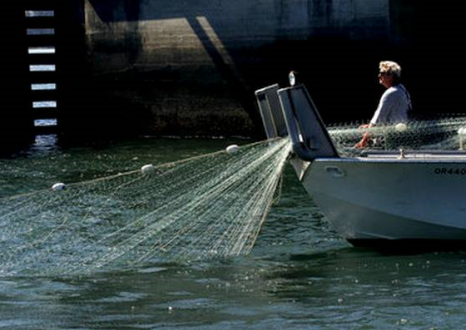
US cancels new protection for endangered West Coast whales
The Trump administration on Monday threw out a new rule intended to limit the numbers of endangered whales and sea turtles getting caught in fishing nets off the West Coast, even though the fishing industry had proposed the measure. The National Marine Fisheries Service said it decided the new protection was not warranted. The action is one of the first by the Trump administration targeting protections for threatened species off the Pacific coast, said Catherine Kilduff, an attorney for the Center for Biological Diversity conservation group. The regulation was designed to reduce the numbers of humpback whales, leatherback sea turtles and other large creatures that accidentally become tangled in mile-long nets set adrift by commercial fishermen overnight to catch swordfish off California and Oregon. click here to read the article (read between the lines, folks) 18:00
Judge says Butt Out! Environmentalists Can’t Help Defend Fishing Rules
 Three environmental groups cannot join the U.S. government to defend against a challenge to an Obama administration rule requiring seafood companies to report the origin of the fish they sell, a federal judge ruled (click to open). The National Resources Defense Council, the Center for Biological Diversity and Oceana asked the court on March 7 to join the government in defending a suit from a group of fishing companies challenging the seafood traceability rule, which requires companies to disclose on a government form the vessel or collection point of origin for their fish. The companies say the rule will make seafood more expensive. The environmentalists say it is critical to protecting fish populations from illegal fishing. The environmentalists made specific arguments in support of the rule, telling U.S. District Judge Amit Mehta that reversal would affect their daily lives. Lol! affect their daily lives? What lives! click here to read the story 10:07
Three environmental groups cannot join the U.S. government to defend against a challenge to an Obama administration rule requiring seafood companies to report the origin of the fish they sell, a federal judge ruled (click to open). The National Resources Defense Council, the Center for Biological Diversity and Oceana asked the court on March 7 to join the government in defending a suit from a group of fishing companies challenging the seafood traceability rule, which requires companies to disclose on a government form the vessel or collection point of origin for their fish. The companies say the rule will make seafood more expensive. The environmentalists say it is critical to protecting fish populations from illegal fishing. The environmentalists made specific arguments in support of the rule, telling U.S. District Judge Amit Mehta that reversal would affect their daily lives. Lol! affect their daily lives? What lives! click here to read the story 10:07
NRDC, CLF, CBD Acts to Defend Atlantic’s First Marine Monument
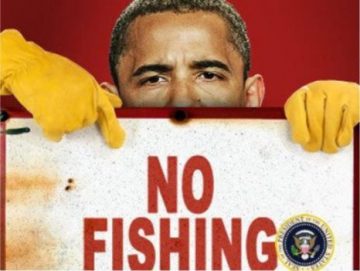 NRDC is seeking to intervene in a lawsuit that challenges the New England marine monument established last September—the first such monument off the continental U.S. Together with other supporters of the Northeast Canyons and Seamounts Marine National Monument, NRDC today filed this motion to intervene in a lawsuit filed earlier this month by five regional commercial fishing associations. This ocean park spans almost 5,000 miles and safeguards ancient coral gardens, endangered sperm whales, Atlantic puffins, and literally thousands of other animal species for the benefit of all Americans. Our goal is to prevent it from being handed back to private industries for commercial exploitation, including commercial fishing, seismic surveying, oil and gas drilling, and mining. We also want to protect the President’s authority to designate future marine monuments and demonstrate that the other four marine monuments–designated by Presidents Obama and George W. Bush—were legally created. Our partners seeking to intervene include a naturalist who leads whale watch tours, Conservation Law Foundation and the Center for Biological Diversity (CBD). Read the rest of this stuff here 17:03
NRDC is seeking to intervene in a lawsuit that challenges the New England marine monument established last September—the first such monument off the continental U.S. Together with other supporters of the Northeast Canyons and Seamounts Marine National Monument, NRDC today filed this motion to intervene in a lawsuit filed earlier this month by five regional commercial fishing associations. This ocean park spans almost 5,000 miles and safeguards ancient coral gardens, endangered sperm whales, Atlantic puffins, and literally thousands of other animal species for the benefit of all Americans. Our goal is to prevent it from being handed back to private industries for commercial exploitation, including commercial fishing, seismic surveying, oil and gas drilling, and mining. We also want to protect the President’s authority to designate future marine monuments and demonstrate that the other four marine monuments–designated by Presidents Obama and George W. Bush—were legally created. Our partners seeking to intervene include a naturalist who leads whale watch tours, Conservation Law Foundation and the Center for Biological Diversity (CBD). Read the rest of this stuff here 17:03
Pacific Bluefin Tuna Heads Toward Protection
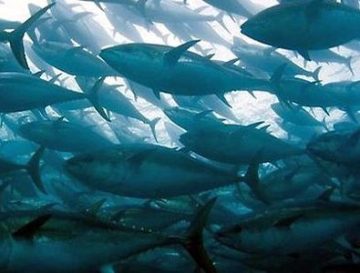 Thirteen conservation groups and a former National Fisheries biologist petitioned for federal protection for Pacific bluefin tuna, and the marine agency agreed listing may be warranted. The National Marine Fisheries Service (NMFS) announced Tuesday that it will begin a 12-month status review of the iconic fish as the first step in the long process to secure Endangered Species Act protection for the overfished species. The Center for Biological Diversity, a frequent petitioner and litigator on behalf of imperiled species, was joined by Earthjustice, Defenders of Wildlife, WildEarth Guardians, Sierra Club, Turtle Island Restoration Network, the Ocean Foundation, Center for Food Safety, Greenpeace, Mission Blue, Recirculating Farms Coalition, The Safina Center, SandyHook SeaLife Foundation, and Jim Chambers, a retired NMFS biologist, owner of Prime Seafood sustainable seafood restaurant supply company and member of the Seafood Choices Alliance. Read the rest here 08:42
Thirteen conservation groups and a former National Fisheries biologist petitioned for federal protection for Pacific bluefin tuna, and the marine agency agreed listing may be warranted. The National Marine Fisheries Service (NMFS) announced Tuesday that it will begin a 12-month status review of the iconic fish as the first step in the long process to secure Endangered Species Act protection for the overfished species. The Center for Biological Diversity, a frequent petitioner and litigator on behalf of imperiled species, was joined by Earthjustice, Defenders of Wildlife, WildEarth Guardians, Sierra Club, Turtle Island Restoration Network, the Ocean Foundation, Center for Food Safety, Greenpeace, Mission Blue, Recirculating Farms Coalition, The Safina Center, SandyHook SeaLife Foundation, and Jim Chambers, a retired NMFS biologist, owner of Prime Seafood sustainable seafood restaurant supply company and member of the Seafood Choices Alliance. Read the rest here 08:42
Environmental group dislikes new rule for listing, delisting or reclassification under the Endangered Species Act
 The U.S. Fish and Wildlife Service and National Oceanic and Atmospheric Administration (NOAA) Fisheries finalized a rule Monday that changes the process by which species are petitioned for listing, delisting or reclassification under the Endangered Species Act (ESA). Under the rule, first proposed in May 2015, petitioners will be required to notify each state wildlife agency where a species is located at least 30 days before submitting a petition to the federal government. The delay will gives states an opportunity to provide agencies with pertinent information on the species. The new rule also restricts the number of species that can be petitioned for at one time. Under the rule, only one species is allowed per petition. The Center for Biological Diversity was quick to slam the rule, calling it an “impediment” to using the Endangered Species Act. “These new restrictions on citizen petitions are nothing more than a gift to industries and right-wing states that are hostile to endangered species,” Brett Hartl, the group’s director of endangered species policy, said in a statement. Read the story here 10:34
The U.S. Fish and Wildlife Service and National Oceanic and Atmospheric Administration (NOAA) Fisheries finalized a rule Monday that changes the process by which species are petitioned for listing, delisting or reclassification under the Endangered Species Act (ESA). Under the rule, first proposed in May 2015, petitioners will be required to notify each state wildlife agency where a species is located at least 30 days before submitting a petition to the federal government. The delay will gives states an opportunity to provide agencies with pertinent information on the species. The new rule also restricts the number of species that can be petitioned for at one time. Under the rule, only one species is allowed per petition. The Center for Biological Diversity was quick to slam the rule, calling it an “impediment” to using the Endangered Species Act. “These new restrictions on citizen petitions are nothing more than a gift to industries and right-wing states that are hostile to endangered species,” Brett Hartl, the group’s director of endangered species policy, said in a statement. Read the story here 10:34
Pointing the finger at “angry Fishermen” for Sea Otter shootings, a $20K Reward has been posted
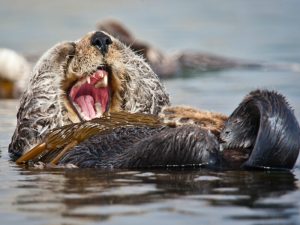 A big reward is waiting for people who can give useful information about who shot dead three sea otters off the Central Coast. The California Department of Fish and Wildlife’s reward of $10,000 for the whistleblowers has been raised to $20,000 after the Center for Biological Diversity announced a similar amount on top of it. Those with information on the sea otter shootings can call the CalTIP line at (888) 334-2258 or the U.S. Fish and Wildlife Service at (650) 876-9078. There is apparent shock over the killing of cute and furry creatures. One report describes how they bring a smile to the face of onlookers, and animal rights advocates are enraged by the wanton killings. In the recent episode, two juvenile otter males and an adult male were killed between late July and early August. The dead bodies were washed up between Santa Cruz Harbor and Seacliff State Beach in Aptos, according to reports. – Read the story here 16:07
A big reward is waiting for people who can give useful information about who shot dead three sea otters off the Central Coast. The California Department of Fish and Wildlife’s reward of $10,000 for the whistleblowers has been raised to $20,000 after the Center for Biological Diversity announced a similar amount on top of it. Those with information on the sea otter shootings can call the CalTIP line at (888) 334-2258 or the U.S. Fish and Wildlife Service at (650) 876-9078. There is apparent shock over the killing of cute and furry creatures. One report describes how they bring a smile to the face of onlookers, and animal rights advocates are enraged by the wanton killings. In the recent episode, two juvenile otter males and an adult male were killed between late July and early August. The dead bodies were washed up between Santa Cruz Harbor and Seacliff State Beach in Aptos, according to reports. – Read the story here 16:07
Environmentalists Wield Powerful Endangered Species Act to Kill Jobs
 Think fish when you read this. From the article: The Center for Biological Diversity (CBD) is a radical environmental legal action group that’s known for frequently suing to block commercial, industrial, and personal activities in an effort to “save the environment,” regardless of who gets hurt. One of the group’s leaders and co-founders, Kieran Suckling, was a well-known activist in the 1980s and has been linked to vandalism and sabotage group Earth First! From its inception, CBD has sought ways to permanently stop natural resource use, and with the help of environmental attorneys, CBD has successfully weaponized the Endangered Species Act (ESA) against ranchers, loggers, miners, (fishermen) and human activity in general. Read the rest here 13:51
Think fish when you read this. From the article: The Center for Biological Diversity (CBD) is a radical environmental legal action group that’s known for frequently suing to block commercial, industrial, and personal activities in an effort to “save the environment,” regardless of who gets hurt. One of the group’s leaders and co-founders, Kieran Suckling, was a well-known activist in the 1980s and has been linked to vandalism and sabotage group Earth First! From its inception, CBD has sought ways to permanently stop natural resource use, and with the help of environmental attorneys, CBD has successfully weaponized the Endangered Species Act (ESA) against ranchers, loggers, miners, (fishermen) and human activity in general. Read the rest here 13:51
Hawaii’s longline fleet dodges hurricanes – Can they survive the Enviro Tsunami?
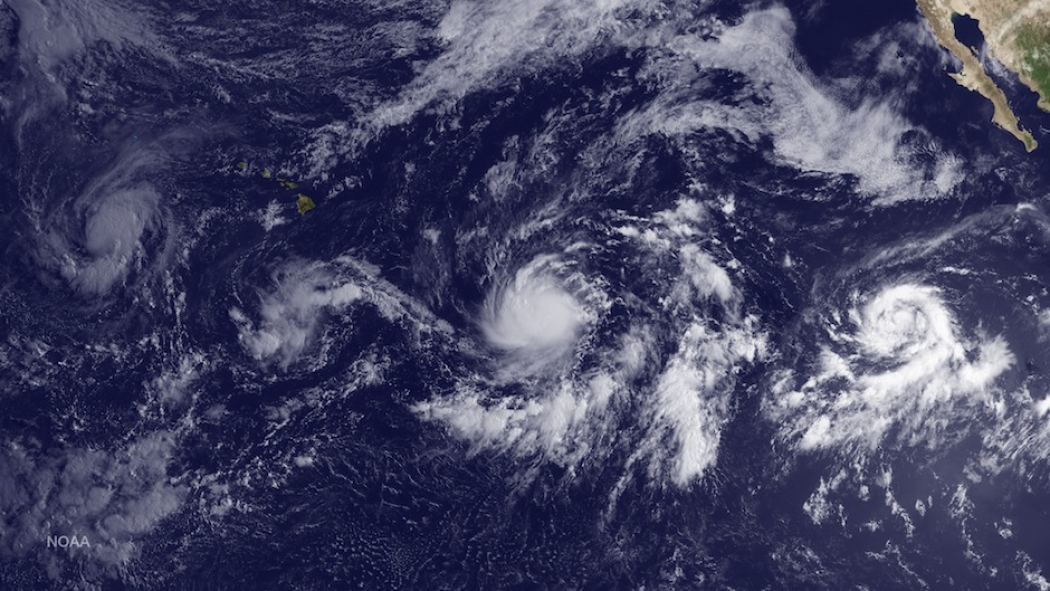 Bigeye tuna caught by Hawaii’s longline industry is in short supply right now as the fleet dodges Hurricane Ignacio and Hurricane Jimena. Some longline vessels that headed out, turned around without catching anything to avoid the powerful storms. In August, Hawaii’s longline fleet hit the bigeye tuna catch limit of 3,502 metric tons established by the Western and Central Pacific Fisheries Commission. Conservation groups, however, have filed a lawsuit to block the change,,, Video, Read the rest here 08:23
Bigeye tuna caught by Hawaii’s longline industry is in short supply right now as the fleet dodges Hurricane Ignacio and Hurricane Jimena. Some longline vessels that headed out, turned around without catching anything to avoid the powerful storms. In August, Hawaii’s longline fleet hit the bigeye tuna catch limit of 3,502 metric tons established by the Western and Central Pacific Fisheries Commission. Conservation groups, however, have filed a lawsuit to block the change,,, Video, Read the rest here 08:23
National Marine Fisheries Service deny petition from radical environmentalists to ban cod fishing
 A group of radical environmental groups including the Center for Biological Diversity and Greenpeace petitioned the National Oceanic and Atmospheric Administration’s National Marine Fisheries Service to shut down the fishery until it shows rebuilding progress. The agency said in a denial published in the Federal Register on July 10 that the current restrictions on cod fishing will “provide sufficient protection” to rebuild the stock. The denial also states that the fisheries service intends to monitor updated information about the cod stock,,, Read the rest here 18:02
A group of radical environmental groups including the Center for Biological Diversity and Greenpeace petitioned the National Oceanic and Atmospheric Administration’s National Marine Fisheries Service to shut down the fishery until it shows rebuilding progress. The agency said in a denial published in the Federal Register on July 10 that the current restrictions on cod fishing will “provide sufficient protection” to rebuild the stock. The denial also states that the fisheries service intends to monitor updated information about the cod stock,,, Read the rest here 18:02
Center for Biological Diversity offended by F&WS – NMFS ESA Proposal
 The two federal agencies tasked with listing endangered species jointly proposed to revise the Endangered Species Act’s petition process, but conservationists are not happy. The proposal published Thursday by the Fish and Wildlife Service and the National Marine Fisheries Service would make the best use of available resources, increase “stakeholder engagement” and improve transparency, according to the agencies’ announcement. Calling the move “boneheaded,” the (CBD), a frequent petitioner and litigant,,, Read the rest here 19:40
The two federal agencies tasked with listing endangered species jointly proposed to revise the Endangered Species Act’s petition process, but conservationists are not happy. The proposal published Thursday by the Fish and Wildlife Service and the National Marine Fisheries Service would make the best use of available resources, increase “stakeholder engagement” and improve transparency, according to the agencies’ announcement. Calling the move “boneheaded,” the (CBD), a frequent petitioner and litigant,,, Read the rest here 19:40
Lawsuit Filed to Save Four Southeast Fish From Extinction
 Center for Biological Diversity filed a lawsui against the U.S. Fish and Wildlife Service. “Human wellbeing is directly tied to the health of our waterways, so it’s scary”,,, The candy darter, ashy darter, longhead darter and frecklebelly madtom are at high risk of extinction due primarily to water pollution and dams. The four fish are found in Alabama, Georgia, Kentucky, Louisiana, Mississippi, Tennessee, Virginia and West Virginia. Read the rest here 18:29
Center for Biological Diversity filed a lawsui against the U.S. Fish and Wildlife Service. “Human wellbeing is directly tied to the health of our waterways, so it’s scary”,,, The candy darter, ashy darter, longhead darter and frecklebelly madtom are at high risk of extinction due primarily to water pollution and dams. The four fish are found in Alabama, Georgia, Kentucky, Louisiana, Mississippi, Tennessee, Virginia and West Virginia. Read the rest here 18:29
Enviros Petition for Immediate and Permanent Rule Making to Prohibit Fishing for Gulf of Maine Cod
 Today’s petition, filed under the Administrative Procedure Act, urges the Fisheries Service to follow the Magnuson-Stevens Fishery Conservation and Management Act requirement to rebuild overfished species. The called for the Fisheries Service to prohibit fishing for Gulf of Maine cod, allowing catch only incidental to other targeted fish, and reduce such bycatch to levels that allow the cod population to rebuild. Read the rest here 13:33
Today’s petition, filed under the Administrative Procedure Act, urges the Fisheries Service to follow the Magnuson-Stevens Fishery Conservation and Management Act requirement to rebuild overfished species. The called for the Fisheries Service to prohibit fishing for Gulf of Maine cod, allowing catch only incidental to other targeted fish, and reduce such bycatch to levels that allow the cod population to rebuild. Read the rest here 13:33
No endangered listing for prized pinto abalone
 The National Marine Fisheries Service has declined to list a prized 6-inch Pacific Ocean marine snail as an endangered or threatened species. The mollusks need federal protection because their populations have plummeted from 80 to 99 percent in much of their range, according to the and the Center for Biological Diversity. “These are species that science shows ocean acidification and climate change are going to do it in,” he (Brad Sewell, a senior attorney for Natural Resources Defense Council) said. Shut up. Read the rest here 21:36
The National Marine Fisheries Service has declined to list a prized 6-inch Pacific Ocean marine snail as an endangered or threatened species. The mollusks need federal protection because their populations have plummeted from 80 to 99 percent in much of their range, according to the and the Center for Biological Diversity. “These are species that science shows ocean acidification and climate change are going to do it in,” he (Brad Sewell, a senior attorney for Natural Resources Defense Council) said. Shut up. Read the rest here 21:36
NMFS Caves to the Enviro Quackeroos on Right Whale federally designated “critical habitat” under the Endangered Species Act
 In 2009, a coalition of environmental and animal protection groups formally petitioned the National Marine Fisheries Service to significantly expand habitat protections to include all of the whales’ nursery and breeding and feeding grounds.,, protected area more than tenfold, from roughly 4,000 square miles to more than 50,000 square miles.,vulnerable to threats that include commercial fishing gear, ship strikes. Read the rest here 12:20
In 2009, a coalition of environmental and animal protection groups formally petitioned the National Marine Fisheries Service to significantly expand habitat protections to include all of the whales’ nursery and breeding and feeding grounds.,, protected area more than tenfold, from roughly 4,000 square miles to more than 50,000 square miles.,vulnerable to threats that include commercial fishing gear, ship strikes. Read the rest here 12:20
Feds Reverse Course, Lift Ban on Fishing for Rare Pacific Bluefin Tuna – Center for Biological Diversity Distraught!
 “Bluefin tuna have been decimated by overfishing, and the world has called in their Pacific bluefin tuna fleets — but California fishermen continue to catch endangered Pacific bluefin tuna,” said Catherine Kilduff with the Center for Biological Diversity. “The Fisheries Service is supposed to protect fish on the path to extinction, not push them deeper into crisis. Yet that’s exactly what they’ve done.” Shut up Lady! Read the rest here 13:27
“Bluefin tuna have been decimated by overfishing, and the world has called in their Pacific bluefin tuna fleets — but California fishermen continue to catch endangered Pacific bluefin tuna,” said Catherine Kilduff with the Center for Biological Diversity. “The Fisheries Service is supposed to protect fish on the path to extinction, not push them deeper into crisis. Yet that’s exactly what they’ve done.” Shut up Lady! Read the rest here 13:27
Center for Biological Diversity to sue NMFS to Protect Disappearing Pinto Abalone From Ocean Acidification, Climate Change and Poaching
 Sustainable. The tax drain of US taxpayers that pay for NMFS, CBD’s tax except status, and for frivolous lawsuits brought forth by the Bender and Bender of Environmental NGO’s. Apparently these nuts believe that NMFS should be sued over Ocean Acidification, Climate Change and Poaching? Read the press release here 21:42
Sustainable. The tax drain of US taxpayers that pay for NMFS, CBD’s tax except status, and for frivolous lawsuits brought forth by the Bender and Bender of Environmental NGO’s. Apparently these nuts believe that NMFS should be sued over Ocean Acidification, Climate Change and Poaching? Read the press release here 21:42
Pacific Bluefin tuna fishery on the hook
 The U.S. sport fishery is only a portion of the total catch of bluefin throughout the Pacific, and U.S. commercial fishing operations play an even smaller role. Commercial fisheries in Mexico, Japan, Korea and Taiwan out of bluefin, and are also under pressure to act. Japan recently agreed to cut its commercial catch by half, and both the U.S. and Mexico recently closed their commercial fisheries, Read the rest here 11:47
The U.S. sport fishery is only a portion of the total catch of bluefin throughout the Pacific, and U.S. commercial fishing operations play an even smaller role. Commercial fisheries in Mexico, Japan, Korea and Taiwan out of bluefin, and are also under pressure to act. Japan recently agreed to cut its commercial catch by half, and both the U.S. and Mexico recently closed their commercial fisheries, Read the rest here 11:47
The Chuckleheads are planning another Lawsuit. – Marin group plans suit to help protect sperm whales
 (They just went through this.) “These endangered sperm whales should be protected from these gillnets,” said Joanna Nasar, spokeswoman for the Turtle Island Restoration Network. “It’s time for the fisheries service to stop these nets from being used.” <Read more here> 22:23
(They just went through this.) “These endangered sperm whales should be protected from these gillnets,” said Joanna Nasar, spokeswoman for the Turtle Island Restoration Network. “It’s time for the fisheries service to stop these nets from being used.” <Read more here> 22:23



































